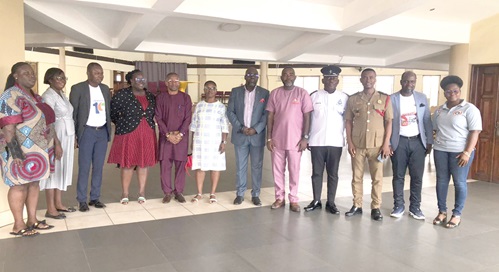The Ghana National Fire Service (GNFS) has appealed to the government to provide more emergency rescue vehicles and personal protective equipment (PPE), especially in areas identified as accident hotspots, to reduce response times to save lives and property.
This is because delays in responding to accidents not only threaten the lives of victims but also pose more danger to other road users.
He was speaking at a breakfast meeting in Accra with corporate social responsibility (CSR) heads, which was organised by the Accidents Support Victims Foundation, a non-governmental organisation.
It was held on the theme: “Championing Systems of Support for Crashed Victims”.
Insensitive actions
Mr Amoah appealed to the public to refrain from taking photos and videos at accident scenes, urging them to instead prioritise calling emergency services to help save lives, describing the practice of sharing distressing images as not only insensitive but also counterproductive.
Rather, he urged the public to make the GNFS their first port of contact in emergencies, emphasising that the GNFS worked hand-in-hand with the Ambulance Service and the police to ensure the timely rescue and transportation of accident victims.
Commending the foundation for their dedicated support in emergency health outreach, the GNFS Assistant Director in charge of Legal called on other NGOs, philanthropists, and corporate bodies to rally behind such life-saving initiatives to improve healthcare access to victims.
Accident victim support
A Marketing Consultant, Kwabena Yeboah, also urged Corporate Ghana to prioritise accident victim support as a core part of their CSR strategies.
He stressed that accident victims often faced prolonged suffering such as social unrest, mental health breakdowns, economic hardship, and even suicidal thoughts, due to the lack of adequate institutional support.
Citing the urgent need for a comprehensive support system for accident victims, he challenged corporate entities to go beyond profits and incorporate meaningful CSR policies that address the welfare of vulnerable people.
He urged companies to recognise that “what some consider a cost is actually an investment” that yields business returns—including tax exemptions, operational efficiencies, and competitive advantage.
He emphasised that accident victim support should not be overlooked, saying, “Whether your CSR focus is on children, health or education, supporting accident victims will yield immeasurable impact. Even small contributions make a big difference.”
Collective efforts
The Superintendent, Kaneshie Division of the Motor Transport and Traffic Directorate (MTTD), Eric Opata, called for collective national action to address the alarming rise in road crashes.
He reaffirmed the Service’s commitment to enforcing road traffic laws while explaining the legal processes that govern police actions in accident investigations.
Answering questions in response to concerns about delays in prosecuting road traffic offenders, he emphasised that the responsibility for punishing offenders lay with the court and not the police.
Objective
The Founder of AVSF, Rev. Cyril Crabbe Bennedict, said every year, thousands of lives were lost to road crashes, with many suffering from life-changing injuries that left them physically, emotionally and financially vulnerable.
He announced plans to launch West Africa’s first ultra-modern rehabilitation and recovery home for persons injured in road traffic accidents.
The proposed centre, he said, would feature 30 rooms equipped with modern medical and support facilities.
He appealed for more support for accident victims, saying donors should not see their contributions as generous acts, but as life-saving interventions.

